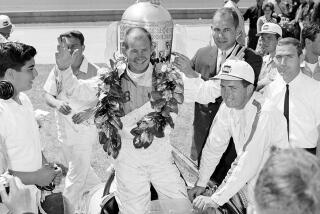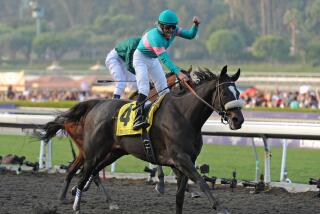Penhall Caught Up With His Dream in ’81 : Speedway: Followers of the sport call the World Final at London’s Wembley Stadium the greatest race ever.
- Share via
NEWPORT BEACH — Ten years ago, speedway motorcyclist Bruce Penhall wore out two Citroen station wagons, spent 400 hours in the air during a three-month stretch and raced in four countries in five days chasing a dream.
The seemingly never-ending trip, during which Penhall competed in 157 meetings in nine months, led to the 1981 World Final, the pinnacle of speedway racing, at London’s Wembley Stadium in front of 92,000.
Speedway, unlike any other form of motor sports racing, crowns its world champion in one night of 20 pressure-packed heats that often lead to a dramatic finish. On this night, Penhall became only the second American to win the world championship in the 54-year history of the sport.
Penhall, then 24, won three of his five heat races by a heartbeat in what many consider to be the greatest World Final.
Phillip Rising, editor of Speedway Star magazine, has covered every world championship race since 1968. He insists there will never be another race quite like the 1981 World Final.
“It’s the only one I’ve ever seen that had every element of a great world championship,” Rising said. “You tend to remember the results or the drama leading up to the winner being crowned. But the 1981 World Final showcased some of the best racing in the history of the sport.
“There was also Penhall’s popularity. There was a great desire to see him become world champion. He was the most popular rider by far in a long, long time. The manner in which he won the championship was fitting for his career. He was a great showman.”
Penhall had been racing professionally for eight years when he became world champion. He grew up racing on Friday nights at the tiny, 190-yard oval at the Orange County Fairgrounds. Penhall was a junior at Newport Harbor High School when he gave up a promising baseball career to become a full-time racer.
In the fall of 1977, he traveled to England and watched Denmark’s Ole Olsen win his second of three world titles at Wembley Stadium. The race changed the course of his life.
“I was this snot-nosed kid from Newport Beach whose only thought was winning a national championship at Costa Mesa,” Penhall said. “When I saw the crowd at Wembley and Ole win the world championship that night, that was a deciding point for me. From that night on, I focused all my energy into winning a world championship.”
Little did Penhall know that four years later he would be battling Olsen--”The Great Dane”--for speedway’s biggest prize on the same track.
THE RACE BUILDUP
In 1980, Penhall had been favored to win the world championship in Sweden but finished a disappointing fifth. Heartbroken, he wept in front of friends, family and an international television audience.
Penhall had cracked under the pressure of his first world championship, but he vowed to return at Wembley. He dedicated the championship to the memory of his parents--LeRoy and Barbara Penhall--who had died in an airplane crash six years earlier.
Penhall was the leading rider for Cradley Heath in the British Speedway League and the overwhelming favorite to win the world title in 1981. Penhall’s popularity was never greater.
Two days before the race, Penhall participated in a practice session at Wembley. He barely got on his bike after doing 35 television and radio interviews.
Olsen, now a three-time world champion, and Englishman Kenny Carter, a bitter rival from Halifax, were Penhall’s main contenders for the title.
“Ole Olsen was the biggest fear to me,” Penhall recalled. “Wembley was his favorite track. He had won two of his three world titles there. He hadn’t been winning all year, and I think he knew this was his last shot.
“I thrived on beating him more than anybody. He was the Great Dane, and there was a tremendous satisfaction beating one of the best riders in the world.”
Penhall arrived with his manager, Pete Adams, early on race day. Penhall and Adams walked the streets of London for several hours and then returned to his hotel room at about 2:30. He took a 90-minute nap.
“I didn’t realize it at the time, but walking around London took my mind off racing,” he said. “I got to Wembley about 5 o’clock and went into the dressing room. I stretched out and tried to relax as much as I could.”
Twenty minutes before the traditional riders’ parade, Penhall walked out of the tunnel to check the track conditions. Thousands of supporters from his league team, Cradley Heath, were sitting directly above the tunnel.
When Penhall stepped onto the track, the decibel level inside the huge stadium increased 10 times as horns erupted and fans screamed. During the riders’ parade, the noise grew, but it wasn’t all favorable.
Thousands of people from Halifax, home of Carter, booed Penhall. “They hated me with a passion,” Penhall said. “But I felt 80% of the crowd was behind me. I had a strong sense of confidence with that crowd behind me.”
THE FIVE HEATS
While circling the track during the parade, Penhall kept repeating to himself, “Hard first corner. Hard first corner.” He knew getting the lead through the first turn on Wembley’s quarter-mile track was critical. Unfortunately, during the course of the evening, he was the first to reach the first turn only twice in five heats.
Penhall won his first race convincingly.
“My first heat was fairly easy, and after I won the heat, I told myself, ‘OK, now it’s time to go to work.’ ”
Penhall was pitted against Danes Hans Nielsen and Olsen in his second heat. Penhall trailed both riders after the first turn but managed to pass Nielsen on the back straightaway. Meanwhile, Olsen had built a three-bike-length lead on Penhall in the second lap.
“I made a mistake against Ole,” Penhall said. “I pushed him to the outside and then I drifted out there myself. My plan was to go underneath him, but I ended up going outside to get around him.”
Penhall passed Olsen on the last turn of the fourth, and last, lap and won the race by half a bike length. How popular was the victory? The usually stoic starting marshals and rakers who groom the track can be seen in the background of a videotape of the race wildly cheering as Penhall crosses the finish line.
Penhall faced Englishman Dave Jessup, the master starter, in his third heat. Penhall got his best start of the night, but Jessup put the pressure on him for two laps and was riding dangerously close to Penhall’s rear wheel when his engine quit. Jessup retired with a broken engine.
After the race, Penhall told CBS television commentator Ken Squires, “I think I have my toughest three heats over with.” Well, he thought so.
Penhall’s fourth heat was another knock-down-drag-out confrontation with yet another Dane, rookie Tommy Knudsen. Penhall underestimated Knudsen and later admitted, “I didn’t think my race with Tommy would be that close.” Few races have ever been closer.
Knudsen started on the pole and Penhall figured he would drift to the outside. Instead, Knudsen went inside as Penhall’s front wheel lifted all the way to the first corner. Now, the race became a game of catch-up.
“I almost hit Tommy coming out of the second turn,” Penhall said. “I decided to keep working him hard, riding outside of him. I passed him the same way and in the same place that I passed Ole Olsen. I don’t think either of them thought I could go around them.”
Videotape shows that Penhall beat Knudsen by two inches. Squire told viewers, “Penhall’s victory was by less than a heartbeat.”
THE CARTER CONFRONTATION
Penhall was the only rider with a perfect score (12) going into his last heat. He only needed to finish third in the last race to win the championship. But standing in the way of the title was an old nemesis, Kenny Carter.
Penhall and Carter had been involved in six altercations during the 1981 season. Both had been reprimanded by the governing Federation of International Motorcyclists. The two had nearly come to blows on the race track.
“We hated each other,” Penhall said. “He was the kind of guy who would deliberately try and put me out of a race.”
Penhall decided it was better to have Carter ahead of him rather than behind so he could watch his every move. He decided to ride cautiously.
There was another problem going into the last heat. While doing a routine fuel check, mechanics found traces of metal shavings in the oil of Penhall’s bike. He decided to switch to his backup bike for the last race.
“Now, all kinds of things start going through your mind,” Penhall said. “You start imagining engine problems. You start hearing every chain rattle. It was the longest four laps in my life.”
Penhall finished second behind Carter, but it didn’t matter. He won the world championship with 14 points. Olsen tied Knudsen for second with 12 points and later beat him in a runoff. Penhall became the first American to win the world championship since Jack Milne in 1937.
THE AFTERMATH
Penhall was carried off the Wembley track by his fellow riders and mechanics. He was late for the traditional toast dinner because he had been detained for interviews well after the race was over.
“I celebrated with my brother, sister and relatives a little that night,” he said. “We all got up early the next day and did a tour of London. But this time we drove. Then, it was time to take them to the airport.
“There really wasn’t a lot of time to celebrate because I had a (race) at Reading on Monday night. My first thought was, ‘I want to get back home and celebrate with everybody.’ ”
Today, Penhall describes the victory at Wembley as “the ultimate high.”
“Winning the 1981 World Final changed my life,” he said. “It opened doors I never knew existed. So many opportunities opened up for me after that race. When I see the videotape, I still get excited watching that race.
“I think they could have taken anybody off the street who knew nothing about motorcycle racing, put them in Wembley Stadium that night, and later I’ll bet he would have said, ‘That was as good as anything I’ve ever seen.’
“I never experienced anything that close on a race track, especially in such an important race. As a racer, no one honestly wants to win that closely. But after it was all said and done, I was proud to be a part of the 1981 World Final.”
More to Read
Go beyond the scoreboard
Get the latest on L.A.'s teams in the daily Sports Report newsletter.
You may occasionally receive promotional content from the Los Angeles Times.










